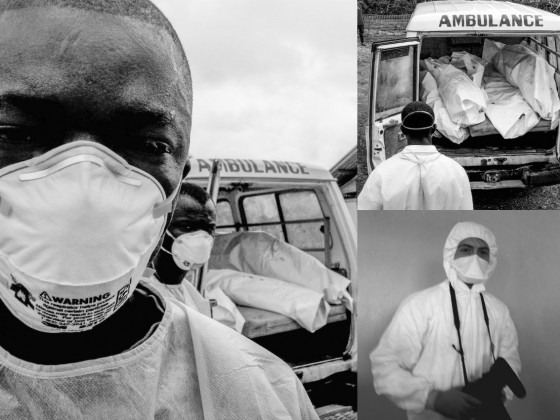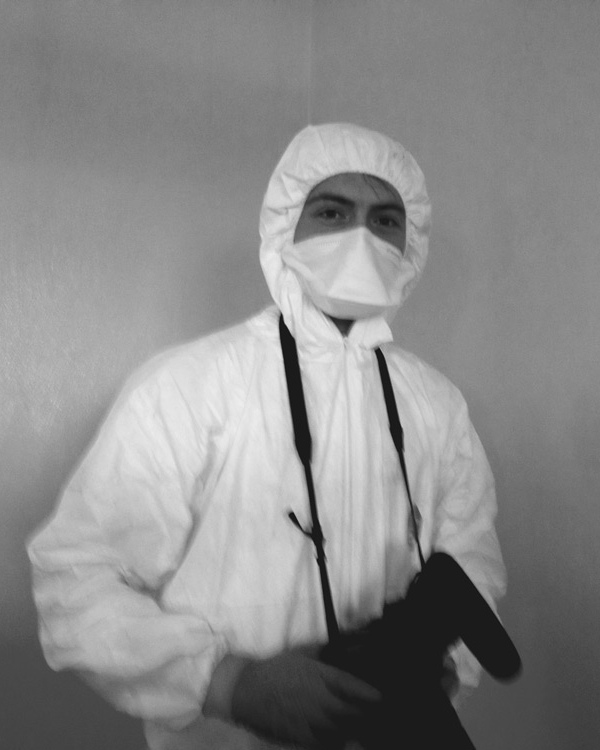“I am a video journalist currently based in West Africa. I grew up in Sheffield in the UK but I don’t think I have stayed in the same place longer than six months since I left school.


What Journalists Carry on the Front Lines: Adam Bailes, West Africa
Over the past four years I have worked as a filmmaker and photographer in countries such as Ukraine, Sierra Leone, Liberia, Lebanon, South Africa, and Europe. I regularly produce work for TV and online news. Most recently I’ve been covering the Ebola outbreak in Sierra Leone West Africa.”
View more of Adam’s work on his site and follow him on Twitter and Instagram.
My everyday DSLR bag for shooting video and stills
1. G3 wireless mics — especially if it’s a busy or noisy place
2. Think tank card case — not waterproof but it holds lots of cards and is small enough to fit in my pocket
3. Zoom H4 — for my lapel mic so I can monitor and record sound separately
4. 5D MK ii + 35mm F2 IS. + small black strap of an old Nikon — IS or image stabilization is perfect for hand-held video
5. 24-105 F4 IS — my number one lens
6. Zacuto z finder + eye cushion — for bright sunlight and the cushion stops sweat when its hot
7. Rode shotgun video mic and windshield
8. Moleskin notepad — I have a stack of them but this little one lives in my camera bag
9. Alcohol-based hand sanitizer — I use about a bottle a day at the moment and I rub it on my hands, arms as well as my gear
10. Loads of spare batteries — sometimes it can be a few days between charges
11. Pens + sharpie — so I can write on anything anytime
12. Rocket lens blower for sand and dust
13. iPhone car charger + In ear headphones — quality is great and easy to replace
14. Dry bag and Domke shoulder bag — stops cameras from getting wet when there’s a downpour
15. Face mask (not pictured) — I use it when close to bodies, but only because there so much chlorine spray in the air
When I shoot for news
1. Three meter XLR cable — small enough so it doesn’t get in the way, but quick and perfect length if I want to take it off my camera to get closer to subjects
2. Canon Xf100 tiny broadcast-quality camera
3. Rode NTG1 shotgun mic + windshield — durable and excellent quality
4. Soft bag for batteries or spare cables
5. iPhone battery case — gives me an extra day between charges and also offers great protection
6. A really good set of headphones — two channels for if I’m running multiple sound
7. Everywhere, green and orange tape — I use it to mark, label and repair my kit
8. Batteries — enough but not too many
9. Think tank card reader + lots of CF cards 4x32GB, 2x16GB
10. Always keep a coin for swapping base plates
What I carry in my pockets
- Scarf for the motorbike — keeps the dust out of my mouth and a whole bunch of other things
- Tatty old wallet — I put a small amount of day-to-day money in here, so I have nothing to worry about if it gets stolen
- Wad of local currency — I keep this separate in a safe pocket
- Malaria tablets + paracetamol
- Sunglasses — the most useful thing even if it’s not sunny, they stop the wind and dust from getting in my eyes

Red Cross (IRC) burial teams workers stare at bodies in back of an ambulance. Only half are loaded. A lack of resources means that many bodies have to be transported at the same time. Kailahun, Sierra Leone.
1The Frontline Freelance Register (FFR) is a representative body for freelancers, created and run by freelancers. It is an independent, ring-fenced entity which sits within the Frontline Club Charitable Trust with membership open to all freelance journalists working in conflict or foreign reporting. The FFR’s core objective is to support the physical and mental well-being of freelance journalists. In a world where staff jobs and fully paid foreign assignments are increasingly scarce, foreign and war reporting is dominated by freelancers, many of whom are deeply committed professionals doing outstanding work. At the same time, many of these freelancers lack the institutional support and the financial means to adequately manage the challenges of operating in dangerous environments in the long term. They also lack organised representation, often leaving them at the mercy of powerful media groups. FFR aims to help freelancers by providing them with a forum, a representative body, and a critical mass to face some of these challenges.



